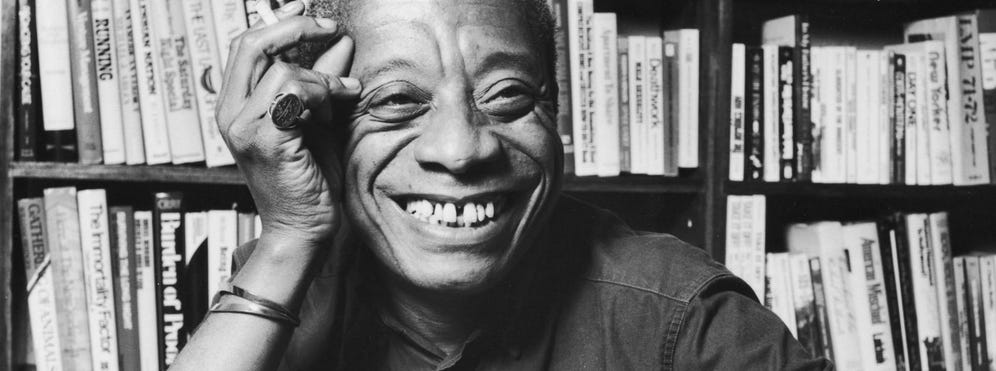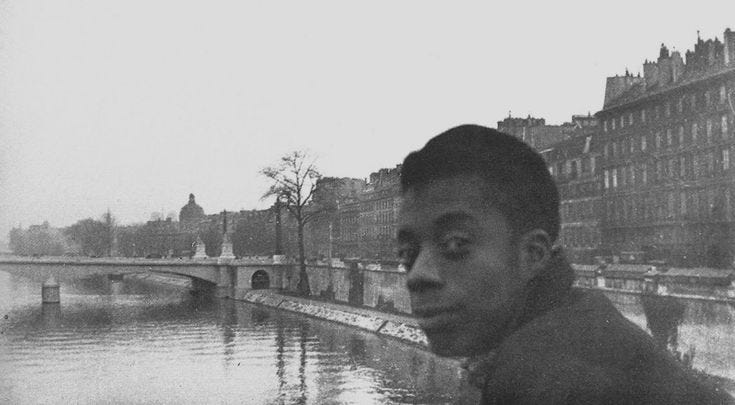“No matter how it seems now, I must confess: I loved him. I do not think that I will ever love anyone like that again. And this might be a great relief if I did not also know that, when the knife has fallen, Giovanni, if he feels anything will feel relief.”
Sometimes we come to books that were pending for a long time, authors that we had been waiting for, and when we finally read them, they leave us with a deep feeling of emptiness. There are books that are too honest, brutal, heartbreaking, at the same time, they are loaded with a sweetness and melancholy that is difficult to achieve, that is Giovanni's Room. Published in 1956, it is controversial for more reasons than one, also heartbreaking for many reasons. Although the book has become an icon for homosexual literature, the story goes further, or at least I think that as readers we can give it many more readings. The story is evocative, painful, the story of two men who love each other but who at the end, as in life, suffer a hard blow of reality, loss and death. The book itself was already a problem at the time; it was also written by a Black, homosexual author, who gave voice to a white man from North America, enough to be rejected. It was described as mediocre, the author was asked not to publish it, fortunately he did it, and gave us a wonderful book, a book that makes you rethink what love means.
Giovanni's room is not just an evocative title, it is a central axis, a small world in which the lives of the protagonists transit, change, hurt and break. Love becomes a sinister element, of horror, an element that pushes people to limits from which there is no return. It is not just about the protagonist's internal struggle to lie to himself, as he repeatedly tells us, trying to deny his love for Giovanni, trying to forcibly love a woman, have sex with women and think that his homosexual attraction does not exist. It is also a failed attempt to become what is expected of him, what he himself hopes to provide to a society that is full of demands. There is a lot of talk about a "dirt", a forbidden, dark, hidden element, but it is within these edges where love and passion, complicity, sweetness emerge and become threads that go from light to tragedy.
”I understood why Giovanni had wanted me and had brought me to his last retreat. I was to destroy this room and give to Giovanni a new and better life. This life could only be my own, which, in order to transform Giovanni’s, must first become part of Giovanni’s room.”
Baldwin doesn't just talk about gay love, in a moving and real way, he talks about a more complex, even more delicate topic: love, as it is, and what desire means. Baldwin himself considered his work to go beyond gay love. In an interview with Richard Goldstein in 1980 he says about it:
"Giovanni's Room is not really about homosexuality… It's about what happens to you if you're afraid to love anybody. Which is much more interesting than the question of homosexuality.
[…]
The question of human affection, of integrity, in my case, the question of trying to become a writer, are all linked with the question of sexuality. Sexuality is only part of it. I don't know even if it's the most important part. But it's indispensable."
The storm, the internal torture of the protagonist arises when he understands that his desires, his love, do not fit into what he himself considers normative. Feeling immense tenderness for Giovanni in the cherry scene, one of the most moving, he instantly begins to feel hatred and terror for him, for the feeling of love he has and for the fear that leaving what he expected would destroy his life.
“Giovanni had awakened an itch, had released a gnaw in me. I realized it one afternoon, when I was taking him to work via the Boulevard Montparnasse. We had bought a kilo of cherries and we were eating them as we walked along. We were both insufferably childish and high-spirited that afternoon and the spectacle we presented, two grown men jostling each other on the wide sidewalk and aiming for the cherry pits, as though they were spitballs, into each other's faces, must have been outrageous. And I realized that such childishness was fantastic at my age and the happiness out of which it sprang even more so; for that moment I really loved Giovanni, who had never seemed more beautiful than he was that afternoon.”
The value of the notion of identity is significant, that complex and dark thing that we try to build, which unfortunately is shaped by how others look at us. The characters in this story look at themselves through how others look at them, through what expectations they may or may not meet, and in that process they forget that love is there, waiting. The room is a body in itself, it describes Giovanni's loneliness, dirt, depression and absence to grow and then be the last place of meeting, of pain, a bad omen. It is no longer just about the love of these two men, it is love as something that scares us, something that destroys us if we do not face it. Baldwin, in a direct and beautiful way, makes his characters mature until death itself, although within a fiction, he does not stop intermingling his own experiences, the experiences of everyone, the voice of any human being that, at least once, has been loved and then destroyed.
“You do not,’ cried Giovanni, sitting up, ‘love anyone! You never have loved anyone, I am sure you never will! You love your purity, you love your mirror—you are just like a little virgin, you walk around with your hands in front of you as though you had some precious metal, gold, silver, rubies, maybe diamonds down there between your legs! You will never give it to anybody, you will never let anybody touch it—man or woman. You want to be clean. You think you came here covered with soap and you think you will go out covered with soap—and you do not want to stink, not even for five minutes, in the meantime.’ He grasped me by the collar, wrestling and caressing at once, fluid and iron at once: saliva spraying from his lips and his eyes full of tears, but with the bones of his face showing and the muscles leaping in his arms and neck. ‘You want to leave Giovanni because he makes you stink. You want to despise Giovanni because he is not afraid of the stink of love. You want to kill him in the name of all your lying little moralities. And you—you are immoral. You are, by far, the most immoral man I have met in all my life. Look, look what you have done to me. Do you think you could have done this if I did not love you? Is this what you should do to love?”
The voice that takes us through the book is a broken voice, fatal from the beginning. He carries no guilt, not until the end, what he carries is pain and abandonment, for himself and the love he left behind. This voice of Baldwin, I repeat, speaks of many elements. The criticism, the social construction, the corruption, the death that each individual faces and the optional blindness that the rest can assume when seeing the broken souls of others around them.
Like any great book, it should also be read in context. This belongs to the late 50s, the notions of sexual freedom, freedom in general, sexuality, machismo, political power; absolutely everything is part of Baldwin's fabric when creating this story, and perhaps even more than sexuality, the factor of what is it and how is a North American man. The construction, the formation of these identities becomes fundamental in this book and all his work, because as he said, "the risk of loving and being free is the same for a gay or a straight man" being society the biggest problem and judge.
And in the end Baldwin proposes us to think about love not only in the sexual aspect, but as souls, as empathetic people, loving moments, sensations, memories. Giovanni is just an excuse for all the other characters and the reader to understand their own emotions and lives, an excuse for the author to talk about what is uncomfortable and necessary: the freedom to love.
"If you cannot love me, I will die. Before you came I wanted to die, I have told you many times. It is cruel to have made me want to live only to make my death more bloody."







Love writers/novels that shine a light on human desire. And the relationship between love and desire is so interesting - love and attachment etc.
This is one of my favourite books of all time. Thank you for this wonderful review! ❤️
I feel this book also speaks volumes in regards to masculinity and internalised homophobia as a result of these gendered standards. Throughout the book, David is extremely disgusted by supposedly “effeminate” men, or men who do not conform to masculine expectations - and this results in his fear of being loved.
Just a few thoughts - again thanks for your writing! It’s inspiring me to pen down some of my own thoughts and reflections on the book.